I thought I was good enough with RegEx that I could read most any one, but this simple one (in Python) has me baffled. www.regexpal.com gives a different result than iPython.
data = 'four year entrepreneurial program. Students develop and run a business, gain much needed ...'
m = re.compile('entrepreneur|business\s(plan|model)')
m.findall(data)
gives ['']
how can that be right? If I wrap the whole thing in parens, it works better but still returns an empty string as a match:
m = re.compile('(entrepreneur|business\s(plan|model))')
m.findall(data)
gives [('entrepreneur', '')]
As I said, the first one works on www.regexpal.com. I also tested it in Python (not iPython) and it fails there too.
